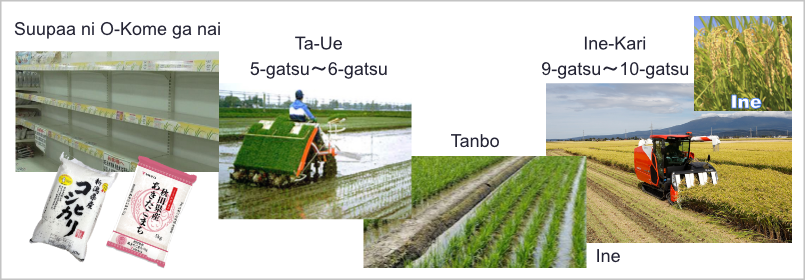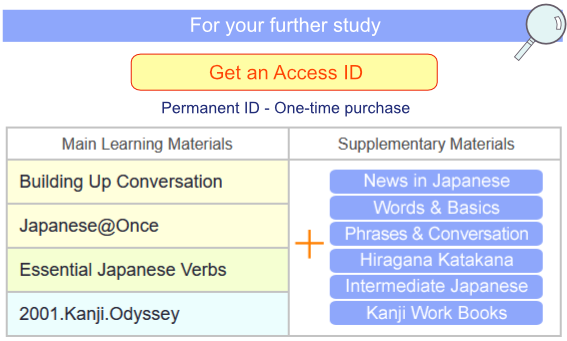
Kotoshi (2024-nen) no 6-gatsu goro kara O-Kome no nedan ga agari-hajimemashita.
Soshite, "Kotoshi wa O-Kome ga tarinai kamo shirenai" to iware-hajimemashita.
Nihon de wa 5-gatsu kara 6-gatsu ni Ta-Ue o shimasu.
"Ta-Ue" to wa Tanbo ni Ine o ueru koto desu.
Soshite, 9-gatsu kara 10-gatsu ni Ine-Kari o shimasu.
"Ine-Kari" to wa "O-Kome no shuukaku" no koto desu.

Desukara, 10-gatsu made wa, o-mise de utteiru O-Kome wa mae no toshi ni toreta O-Kome desu.
Kyonen (2023-nen) wa moosho no eikyoo de O-Kome ga amari toremasendeshita.
Sono tame, kotoshi no 6-gatsu goro kara O-Kome ga shinausu ni natte, neagari shimashita.

Sarani, 8-gatsu 8-ka, Kyuushuu de yaya tsuyoi jishin ga arimashita.
Kishoo-choo wa "Kyodai jishin ga okiru kamo shirenai kara, chuui shite" to yobikakemashita.
Suruto, tsugi no hi, suupaa kara O-Kome ga kiemashita.
Takusan no hito ga Kai-dame o shita kara desu.
Sore kara 1-kagetsu tachimasu ga, suupaa ni wa izen O-Kome ga arimasen.
Unyoku atte mo, nedan wa tsuujoo no 1.5-bai gurai desu.
Seifu wa "O-Kome wa juubun aru kara, kai-dame shinaide kudasai".
"10-gatsu ni nareba, Shinmai ga demasu" to yobikakete imasu.
Demo, kotoshi no natsu mo kiroku-teki na moosho deshita.
Sarani, zenkoku kakuchi de oo-ame ga futte, noosanbutsu ni ookina higai ga demashita.
Moshi, kotoshi O-Kome ga juubun torenakattara,
rainen no ima goro Nihon wa shinkoku na Kome-busoku ni naru kamo shiremasen.
Practice Each Sentence
 |
1. | Kotoshi (2024-nen) no 6-gatsu goro kara O-Kome no nedan ga agari-hajimemashita. |
kotoshi this year, nisen-nijuu-yo-nen year 2024, roku-gatsu June
-goro around (time), -kara from, o-kome / kome (uncooked) rice, gohan (cooked) rice / meal
nedan price, agarimasu to go up, rise, [stem] + hajimemasu to start to do, begin to do
 |
2. | Soshite, "Kotoshi wa O-Kome ga tarinai kamo shirenai" to iware-hajimemashita. |
soshite and, kotoshi this year, o-kome / kome (uncooked) rice
tarinai nai form of tariru; be not enough, be short, be lacking
-kamo shirenai probably, maybe, perhaps, possibly, -to quotation marker; ".....", that
iwaremasu passive form of iimasu; be said, be told, [stem] + hajimemasu to start to do, begin to do
 |
3. | Nihon de wa 5-gatsu kara 6-gatsu ni Ta-Ue o shimasu. |
Nihon de in Japan, go-gatsu May, -kara from, roku-gatsu June, -ni specific time marker; in, at, on
ta-ue rice-planting, tanbo rice field, rice paddies, uemasu to plant (tree, flower, vegetable)
 |
4. | "Ta-Ue" to wa Tanbo ni Ine o ueru koto desu. |
ta-ue rice-planting, [A] to wa [B] no koto [A] means [B], -to quotation marker; ".....", that
 |
5. | Soshite, 9-gatsu kara 10-gatsu ni Ine-Kari o shimasu. |
soshite and, ku-gatsu September, juu-gatsu October
ine-kari rice harvesting, rice reaping, ine rice plant, karimasu to cut, mow, reap, trim
 |
6. | "Ine-Kari" to wa "O-Kome no shuukaku" no koto desu. |
ine-kari rice harvesting, rice reaping, -to quotation marker; ".....", that
[A] to wa [B] no koto [A] means [B]
 |
7. | Desukara, 10-gatsu made wa, o-mise de utteiru O-Kome wa mae no toshi ni toreta o-kome desu. |
desukara therefore, -made to, till, until, o-mise store, shop, restaurant, -de place marker; in, at
utteiru (place de something o +) they sell, store sells, o-kome / kome (uncooked) rice
mae no toshi the previous year, the year before, mae no former, previous
toshi year, -ni specific time marker; in, at, on, toreta ta form of toreru; be produced, be caught, be yielded
 |
8. | Kyonen (2023-nen) wa moosho no eikyoo de O-Kome ga amari toremasendeshita. |
kyonen last year, nisen-nijuu-san-nen year 2023
moosho extremely hot, intense heat, scorching heat, -no eikyoo de due to, because of (the influence of)
eikyoo [sv] influence, effect, affect, -de cause marker; by, because, due to
o-kome / kome (uncooked) rice, amari (+ negative) not very, not much, not so
toremasu to be produced, be caught, be yielded
 |
9. | Sono tame, kotoshi no 6-gatsu goro kara O-Kome ga shinausu ni natte, neagari shimashita. |
sono tame because of that, kotoshi this year, roku-gatsu June
shinausu shortage of supply, short supply, natte te form of -ni naru; become, come to
ne-agari [sv] rising in price, increase in price, nedan price, agarimasu to go up, rise
 |
10. | Sarani, 8-gatsu 8-ka, Kyuushuu de yaya tsuyoi jishin ga arimashita. |
sarani moreover, besides, hachi-gatsu August, yooka 8th. of the month
Kyuushuu Kyuushuu island, -de place marker; in, at, yaya a little, a bit, slightly, somewhat
tsuyoi strong, powerful, jishin earthquake, arimasu there is, to have, happen
The following audio is available to members
 |
11. | Kishoo-choo wa "Kyodai jishin ga okiru kamo shirenai kara, chuui shite" to yobikakemashita. |
Kishoo-choo Japan Meteorological Agency, kishoo weather, meteorological phenomena
kyodai [na] huge, jishin earthquake, okiru to happen, occur
-kamo shirenai probably, maybe, perhaps, possibly, -kara because
chuui shite (kudasai) please pay attention, please be careful
chuui [sv] pay attention, be careful, watch, -te kudasai Please do
-to quotation marker; ".....", that, yobikakemasu to call attention, appeal, warn
 |
12. | Suruto, tsugi no hi, suupaa kara O-Kome ga kiemashita. |
suruto then, tsugi no hi (the) next day, the following day, tsugi next, following, hi day, date
suupaa supermarket, grocery store, -kara from, o-kome / kome (uncooked) rice, kiemasu to disappear, go out
 |
13. | Takusan no hito ga Kai-dame o shita kara desu. |
takusan no hito many people, a lot of people, takusan many, a lot of, hito person, people
kaidame [sv] stock up, panic buying, kaimasu to buy, -kara because
 |
14. | Sore kara 1-kagetsu tachimasu ga, suupaa ni wa izen O-Kome ga arimasen. |
sore kara after that, since that, ikkagetsu (for) one month
[time] tachimasu [time] pass, -ga a conjunction meaning "but"
suupaa supermarket, grocery store, -ni place marker; in, at, on
izen still, o-kome / kome (uncooked) rice, arimasu there is, to have
 |
15. | Unyoku atte mo, nedan wa tsuujoo no 1.5-bai gurai desu. |
un-yoku luckily, un luck, fortune, yoku ku form of ii; good, well
atte te form of aru; there is, have, -te mo even, even if
nedan price, tsuujoo usual(ly), normal(ly), itten-go-bai 1.5 times
-ten dot, point, decimal point, -bai double, times as (much, many, long, high) as
-gurai / -kurai about, approximately
 |
16. | Seifu wa "O-Kome wa juubun aru kara, kai-dame shinaide kudasai". |
seifu government, juubun [na] enough, aru there is, to have, -kara because
kai-dame [sv] stock up, panic buying, -naide kudasai please do not do
 |
17. | "10-gatsu ni nareba, Shinmai ga demasu" to yobikakete imasu. |
juu-gatsu October, nareba ba conditional form of naru; become, come to
shin-mai new rice, shin- new (something), demasu to come out, appear / be brought, be given, be served
-to quotation marker; ".....", that, yobikakete te form of yobikakeru; call attention, appeal
-te imasu expressing progressive or state
 |
18. | Demo, kotoshi no natsu mo kiroku-teki na moosho deshita. |
demo but, however, kotoshi this year, natsu summer, -mo also, too
kiroku-teki [na] record-breaking, record-setting, moosho extremely hot, intense heat, scorching heat
 |
19. | Sarani, zenkoku kakuchi de oo-ame ga futte, noosanbutsu ni ookina higai ga demashita. |
sarani more, moreover, zenkoku whole country, nationwide, kakuchi each placee / many places
-de place marker; in, at, oo-ame heavy rain, oo- big, large / very
ame ga furu it rains, futte te form of furu; fall (rain, snow)
noosanbutsu agricultural products, farm products, ookina big, large / great, serious
higai ga demasu have damege, be damaged, suffer damage, higai damage, harm
demasu to come out, appear / have damage
 |
20. | Moshi, kotoshi O-Kome ga juubun torenakattara, rainen no ima goro Nihon wa shinkoku na Kome-busoku ni naru kamo shiremasen. |
moshi used with -tara and emphasizes "if"
kotoshi this year, o-kome / kome (uncooked) rice, juubun [na] enough
torenakatta nakatta form of toreru; be produced, be caught, be yielded, -tara if, when
rainen no ima goro around this time next year, ima goro about this time
shinkoku [na] serious, kome-busoku rice shortage, -busoku shortage, be short (comes from "Fusoku")
-ni naru to become, come to, it will be, -kamo shiremasen probably, maybe, perhaps, possibly
Drills & Vocabulary
Functional patterns used in the sentences (Chapter numbers are from Building Up Conversation)
o-kome no nedan ga agari-hajimemashita / iware-hajimemashita
verb stem + -hajimemasu:start to do
Level 3 Chapter 13
o-kome ga tarinai kamo shirenai / kyodai jishin ga okiru kamo shirenai / kome-busoku ni naru kamo shiremasen
plain form + kamo shiremasen:expressing possibility; possibly, probably, could be, may be
Level 2 Chapter 8
kyodai jishin ga okiru kamo shirenai kara, chuui shite / kaidame o shita kara desu / o-kome wa juubun aru kara
plain form + kara / -da kara:expressing a reason or a cause; because, therefore, so
Level 2 Chapter 3
chuui shite (kudasai) / kaidame shinaide kudasai
verb te form (-nai form) + -te kudasai (-naide kudasai):please do / please don't do
Level 2 Chapter 5
kome-busoku ni naru kamo shiremasen / o-kome ga shinausu ni natte
-ku narimasu / -ni narimasu:become, come to
Level 2 Chapter 9
omise de utteiru o-kome / mae no toshi no toreta o-kome
phrase + noun:Noun Modifier
Level 2 Chapter 13
omise de utteiru o-kome
verb te form + -te imasu:expressing the progressive, a state of being or a habitual action
Level 2 Chapter 4
zenkoku kakuchi de oo-ame ga futte / o-kome ga shinausu ni natte
te form -te / -kute / -de:used as a conjunction "and", also indicate a reason or cause; because, due to
Level 2 Chapter 6
unyoku atte mo
te form + mo, (-temo / -demo):even, even if, even though
Level 2 Chapter 8
10-gatsu ni nareba, shinmai ga demasu
ba form ; -ba,:ba conditional form; If
Level 2 Chapter 15
kotoshi o-kome ga juubun torenakattara
ta form + -tara:if, when
Level 2 Chapter 8














